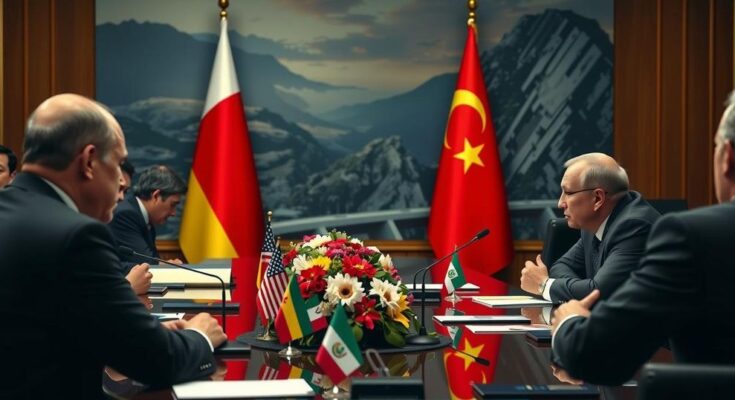In Kazan, Russia, President Vladimir Putin presided over the BRICS summit, attended by leaders from China, India, and other nations, focusing on enhancing financial cooperation, regional stability, and challenging Western dominance. Xi Jinping advocated for de-escalation in Ukraine while seeking broader support for peace efforts. The summit marked a significant diplomatic gathering, showcasing the burgeoning cooperation among developing economies.
During a recent summit held in Kazan, Russia, President Vladimir Putin hosted leaders from the BRICS bloc, including China’s Xi Jinping and India’s Narendra Modi, amidst calls for strengthening alliances among developing economies. The event aimed to enhance cooperation and expand the influence of BRICS on the global stage, particularly in countering Western dominance. President Xi Jinping called for de-escalation in the Ukraine conflict, echoing sentiments of fostering peace through dialogue while simultaneously underscoring the importance of BRICS in ensuring a more balanced global framework. Throughout the summit, discussions centered around developing alternatives to Western financial systems and promoting collaborative efforts to resolve regional conflicts, particularly against the backdrop of Russia’s ongoing geopolitical challenges. The three-day summit underscored the growing coalition of BRICS nations, which, since its inception in 2009, has expanded from its original five members—Brazil, Russia, India, China, and South Africa—to include countries such as Iran, Saudi Arabia, and the United Arab Emirates. Several nations have shown interest in joining, indicated by the presence of leaders from 36 countries at the summit, which Putin described as affirming the failure of Western attempts to isolate Russia due to its actions in Ukraine. The meeting was portrayed as a significant diplomatic achievement, positing BRICS as a counterweight to the perceived inconsistencies of Western policies.
The BRICS alliance serves as a collaborative platform for developing countries to gather and address mutual interests, particularly in the realm of global governance and economic cooperation. Its expansion reflects the desire of non-Western nations to establish new trade frameworks and mechanisms that reduce reliance on Western-dominated systems, such as SWIFT, particularly in the context of economic sanctions. The summit also coincided with ongoing tensions related to Russia’s military involvement in Ukraine, with leaders advocating for a unified stance against Western coercion in global affairs.
The BRICS summit in Kazan was a pivotal event showcasing the bloc’s dedication to enhancing cooperation among developing economies, with a focus on financial independence and regional stability. Leaders convened to discuss alternatives to existing Western financial networks, affirming their commitment to a collaborative approach in addressing global challenges. The summit’s outcomes reflect an increasing realization among non-Western nations of the need to unite against unilateral sanctions and economic pressures. This convergence of interests is likely to shape the future dynamics of international relations as developing nations assert their influence and identity on the world stage.
Original Source: apnews.com




